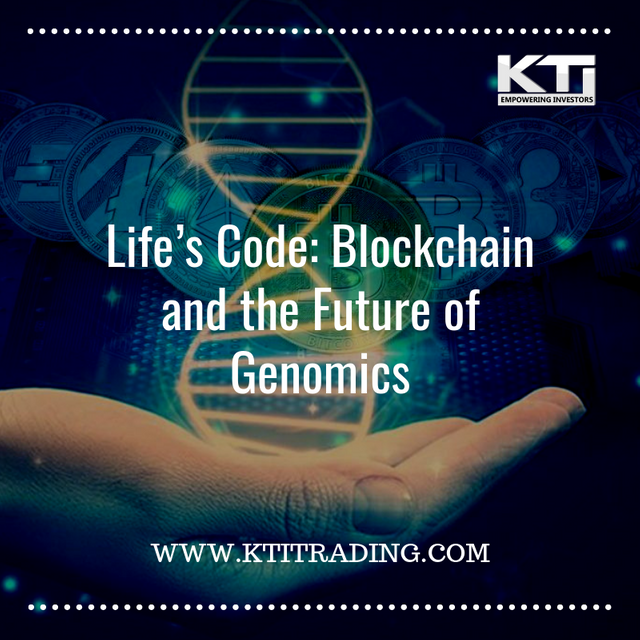Life’s Code: Blockchain and the Future of Genomics

In an era of hotly contested debates surrounding data ownership, privacy and monetization, one particular piece of data could be said to be the most personal of all: the human genome.
For those concerned to protect this most critical form of identity, blockchain has piqued considerable interest as a powerful alternative to the closed architectures and proprietary exploits of the existing genomics data market — promising in their stead a secure and open protocol for life’s code.
As genomic data-driven drug design and targeted therapies evolve, pharmaceutical and biotech companies’ interest is expected to catapult the genomics data market in the coming years, with a forecast to hit $27.6 billion by 2025.
Generating the explosion of big genomic data that is still needed to decode the 4-bits of the living organism faces hurdles that are not only scientific, but ethical, social and technological.
He has now placed another bleeding-edge technology at the center of the genomics revolution: blockchain.
Last year, Church — alongside Harvard colleagues Dennis Grishin and Kamal Obbad — co-founded the blockchain startup Nebula Genomics.
Church had been trying for years to accelerate and drive genomic data generation at scale.
He had appealed to volunteers to contribute to his nonprofit Personal Genome Project (PGP) — a ‘Wikipedia’ of open-access human genomic data that has aggregated around 10,000 samples so far.
By allowing people to monetize their genomes and sell access directly to data buyers, Nebula thinks its platform could help drive sequencing costs down “to zero or even offer [people] a net profit.” While Nebula won’t subsidize whole genome sequencing directly, a blockchain model would allow interested buyers — say, two pharmaceutical companies — to pitch in the cash for someone’s sequence in return for access to their data.
Nebula ran a survey that found that, rather than simply affordability, privacy and ethical concerns eclipsed all other factors when people were asked whether or not they would consider having their genome sequenced.
“The consequences are very difficult to imagine, but in a world [in which] people are building carriers like viruses that will spread to cells in the body and edit them — it’s frightening, but in fact, all the building blocks are already there: genome sequencing, breaches of data, gene editing.
Federal Trade Commission opened a probe into popular consumer genetic testing firms — including 23andMe and Ancestry.com — over their policies for handling personal and genetic information, and how they share that data with third parties.
Battle-proof, anonymized blockchain systems for the genomics revolution In this increasingly opaque genomics data landscape, private firms monetize the genotypic data spawned by their consumers, and sequence data is fragmented across proprietary, centralized silos — whether in the unwieldy legacy systems of health care and research institutions or in the privately-owned troves of biotech firms.
Users would have the option to remain anonymous, but a permissioned blockchain system with verified, validator nodes would require data buyers who use the network to be fully transparent about their identity: Generating and sharing access to this data is crucial for decoding the genome through a correlation of variants and traits.
But as Grishin notes, being largely self-reported, the quality of much of the existing data is uncertain, and a tokenized genomics faces one hurdle in this respect: “If people will be able to monetize their personal genomic data, then you can imagine that some people might think, ‘If I claim to have a rare condition, many pharma companies will be interested in buying access to my genome’ — which is just not necessarily true.
The value of a genome is kind of difficult to predict and it's not correct to say that if you have something rare, then your genome will be more valuable.
Nebula, for its part, envisions that even on a blockchain, data transfer is unnecessary and ill-advised, given the unique sensitivity of genomics.
“Your data can be analyzed locally on your computer by you just running an app on your data yourself […] with additional security measures in place — for example, by using homomorphic encryption to share data in an encrypted form.” Grishin explained that homomorphic techniques encrypt data but ensure that it is not “nonsensical” — creating “transformations that morph the data without disturbing it”: “The data buyer doesn't get the underlying data itself but computes on its encrypted form to derive results from it.
Code is therefore being moved to the data rather than data being moved to researchers.” Encrypted data can be made available to developers of so-called genomic apps — something that Nebula, DNAtix and many other emerging startups in the field all propose as one means of providing users with an interpretation of their data.
Consumer genetic testing firms have already been accused of leaving their clients “with lots of data and few answers.” Beyond satisfying genealogical curiosity and interpreting a range of ‘wellness’ genes, 23andMe can reveal whether you carry a genetic variant that could impact your child’s future health and has — as of 2017 — even been authorized to disclose genetic health risks, including for breast cancer and Parkinson’s.
Brama used the analogy of a deck of cards to explain how blockchain could be the key to starting to bring this data into connection, all the while protecting data owners’ anonymity.
A user might choose to put the correlation between transactions for their different wallets on the blockchain and make it public for people to bid on the underlying data.
Professor Church has made an analogy that likely rings bells for anyone plugged into the crypto and blockchain space, saying that “right now, genome sequencing is like the internet back in the late 1980s.
Article made by Silvia

Congratulations @ktitrading! You have completed the following achievement on Steemit and have been rewarded with new badge(s) :
Click on the badge to view your Board of Honor.
If you no longer want to receive notifications, reply to this comment with the word
STOP